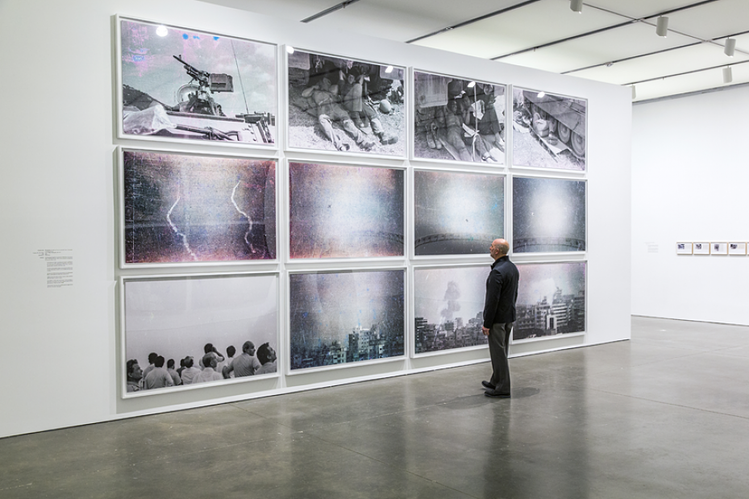And here’s the translation from the monopol article mentioned and linked to in the post above:
"Boycott is contagious: Discussion of Walid Raad’s BDS connection
The city of Aachen does not want to award its art prize to the artist Walid Raad - because of his connections to the boycott movement BDS, which is critical of Israel. A comment
The artist Walid Raad has made an international name for himself with his thoughtful and poetic work on the legacy of the war in his homeland Lebanon. In the West, Raad, who now teaches in New York, is one of the most prominent mediators of the art of the Arab world: his archives of the Atlas Group, an imaginary foundation that deals with the memories of the Lebanese civil war, caused a sensation at Dokumenta 11 in 2002, followed by major solo exhibitions in Berlin and elsewhere, and he is a founding member of the Akademie der Künste der Welt in Cologne. One might think that he is a more than worthy candidate for the Art Prize of the City of Aachen, which is traditionally awarded together with the Kunstfreundeverein of the Ludwig Forum and the Aachener Wirtschaft.
Now, however, the city of Aachen has withdrawn from the award ceremony: because of Raad’s connections to the BDS movement, which wants to use “boycotts, disinvestments and sanctions” to dissuade the State of Israel from its repressive policy towards the Palestinians. “We have to assume, after appropriate research, that the designated prize winner is a supporter of the BDS movement and has participated several times in measures for the cultural boycott of Israel”, said Lord Mayor Marcel Philipp (CDU) according to Dpa. Raad did not sufficiently distance himself from the movement.
BDS classified as anti-Semitic by Bundestag
The rejection of the BDS is becoming the official line in Germany: in May the German Bundestag had classified the BDS as anti-Semitic in a resolution, the state of NRW has already decided not to provide any more space for the movement.
Now the BDS activists in Germany are really not very pleasant contemporaries. What toxic effect their campaigns can have on local cultural events could be seen at the 2018 Pop Culture Festival in Berlin: The BDS called for its boycott because an Israeli singer there was supported by the Israeli Embassy with a small travel allowance - in the end, all bands from the Arab world cancelled. International understanding is different. But is it really a good idea to react to the boycott with more and more boycotts and to exclude from the outset all those who have ever been associated with the BDS?
Yes, the BDS is also supported by Hamas, among others, which does not recognize the right of the State of Israel to exist. And yes, parts of the BDS hold views that have been classified as anti-Semitic. But the decision of the Bundestag to equate the BDS with anti-Semitism was even criticized by numerous well-known Israeli and Jewish intellectuals.
Aachen had hardly any other choice
In a letter to the federal government initiated by the historian Amos Goldmann and signed by some 240 scholars and cultural workers, the Bundestag had allowed itself to be instrumentalized by the ultra-right Israeli government, which tried everything to make any criticism of Israel’s actions against the Palestinians appear anti-Semitic. The goals of the BDS - end of the occupation of the Palestinian territories, equality of Palestinian citizens of Israel and the right to return of refugees - are documented under international law, even if the latter is “worth discussing”.
The official line of the parties in Germany now makes it almost impossible for municipalities or state institutions to cooperate with BDS supporters - the city of Aachen had little choice but to uninvite Walid Raad again. Nevertheless, it is wrong. In fact, almost all artists from the Arab world would then have to be excluded from the discourse here in the future, because one can assume that the overwhelming majority of them would never publicly distance themselves from the BDS as a pro-Palestinian initiative.
Preserving biennials and museums as places of encounter
And you would also lose many, many other artists from the USA, Great Britain and many other countries. Do you want to check before an international biennial whether the invited artists from all over the world might be in contact with political initiatives whose aims you don’t share? Can you do that? Or shouldn’t you rather concentrate on whether the works on show express what you want from art?
Boycott is a highly contagious virus. Unlike the music business, the art scene in Germany has so far been spared BDS boycott calls. Biennials and museums are places where artists can meet who are otherwise separated by cultural and political walls - like Israelis and Palestinians.
The harder the lines of conflict, the more important is the alternative space of culture that makes conversations possible. We should do everything we can to preserve this space."
Translated with www.DeepL.com/Translator
